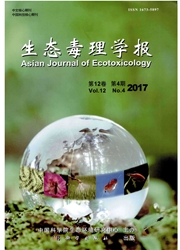

 中文摘要:
中文摘要:
硝化作用是对土壤重金属生物毒性最敏感的微生物过程之一.采用室内模拟的方法,研究了Cu对我国17种典型土壤潜在硝化速率(PNR)的影响.结果表明:随着添加Cu浓度的升高,17种土壤的PNR均呈阶梯状降低,Cu可显著抑制土壤硝化作用;17种土壤EC50值(使PNR降低至对照一半所需Cu浓度)在73.4-2164.4mg·kg^-1之间;土壤EC50分别与土壤pH、Mg和Ca含量呈显著正相关关系(p〈0.05,p〈0.01);PNR(0原始土样的硝化速率)与土壤粘度(〈2μm)、Al含量呈显著负相关关系(p〈0.01),与pH呈显著正相关关系(p〈0.01);EC50、PNR0与阳离子交换量、土壤Cu背景值相关性不大.
 英文摘要:
英文摘要:
Nitrification is one of the most sensitive microbial processes. Effects of Cu on potential nitrification rate (PNR) in 17 kinds of typical soils in China were studied using laboratory simulation experiments. Results showed that, the PNR in 17 kinds of soils decreased in the form of ladder, with the increase of Cu contents in soils. Cu could significantly inhibit the nitrification in soils. The EC50 values (Cu contents which reduced the PNR to 50% of control ) were 73.4-2164.4mg·kg^-1 There were significantly positive correlations between EC50 values and soil pH, Mg, and Ca contents(p〈0.05, p〈0.01 ). Significantly negative correlations(p〈0.01 ) between PNR0(potential nitrification rate of original soil samples)and clay (〈2μm) and Al contents, and a significantly positive correlation (p〈0.01)between PNRo and pH were found. The correlations between EC50, PNRo and CEC, background values of Cu were not obvious.
 同期刊论文项目
同期刊论文项目
 同项目期刊论文
同项目期刊论文
 Leaching impacts Ni toxicity threshold differently among soils but increases its predictability acco
Leaching impacts Ni toxicity threshold differently among soils but increases its predictability acco Effect of bone char addition on the fractionation and bio-accessibility of Pb and Zn in combined con
Effect of bone char addition on the fractionation and bio-accessibility of Pb and Zn in combined con Combined effects of chromium and arsenic on rice seedlings (Oryza sativa L.) growth in solution cult
Combined effects of chromium and arsenic on rice seedlings (Oryza sativa L.) growth in solution cult 期刊信息
期刊信息
